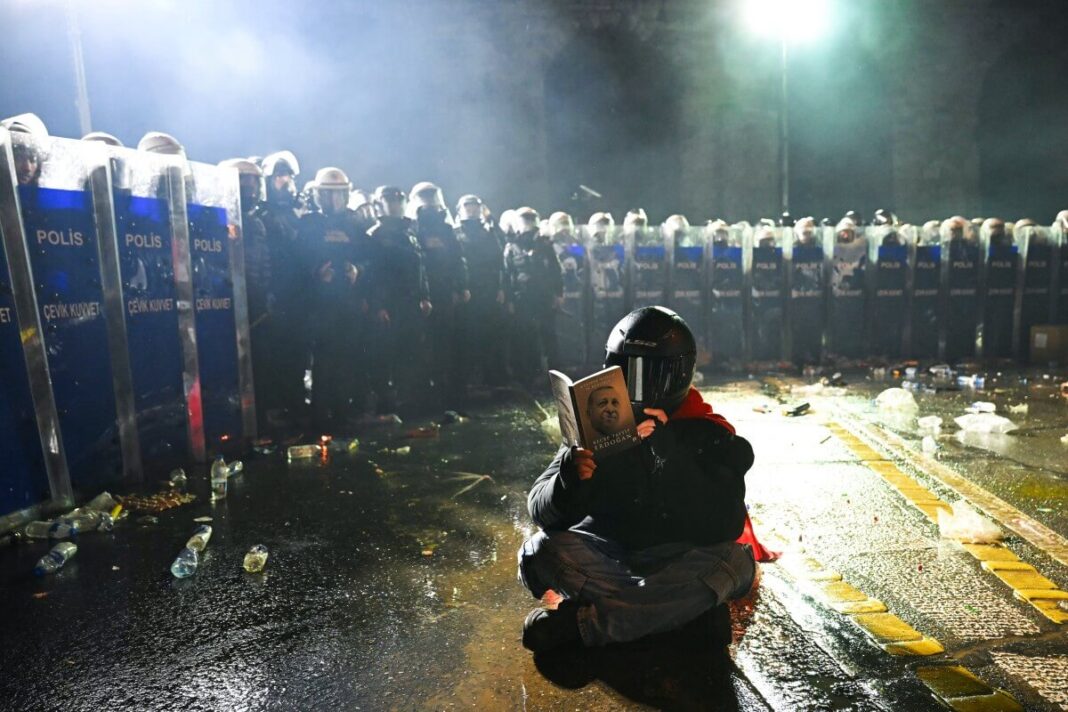Ömer Murat*
Undeniably, the primary catalyst that prompted Turkish President Recep Tayyip Erdoğan to arrest his strongest political rival, İstanbul Mayor Ekrem İmamoğlu, was the discernible rift between the United States and Europe following the re-election of Donald Trump and the Trump administration’s propensity to align itself with Europe’s far-right and populist autocrats, such as Hungarian Prime Minister Viktor Orbán.
Trump’s threats to withdraw the US security umbrella provided to Europe further increased the importance of Turkey, with its robust defense industry and substantial military, to Europe’s security. Consequently, Erdoğan now possesses an additional strategic asset that can be utilized to exert pressure on Europe, akin to the “migrant card,” thereby further complicating the relationship between Turkey and Europe. It is noteworthy that Erdoğan is acutely aware of Europe’s reluctance to confront him in the face of two major challenges: Trump’s America and Putin’s Russia.
While the reasons for Europe’s relatively subdued response to the Turkish government following İmamoğlu’s arrest are evident, the question of whether this approach is appropriate remains ambiguous.
The Trump administration’s vision for the global system is predicated on the notion that militarily and economically dominant nations should be empowered to pursue their own interests, even if this course of action may ultimately serve to erode the authority of international organizations and the rule of law. This vision, in essence, suggests a disregard for values such as democracy, human rights and the rule of law in international relations.
In the context of Europe’s evolving policy response to this approach, a critical question arises: Will Europe emulate Trump’s America and compromise on values such as human rights and the rule of law in order to prioritize its strategic interests and the new security architecture it seeks to build? Or will Europe maintain these values as fundamental, leading to a policy that refuses to compromise on these principles under any circumstances?
European leaders have articulated a clear position, asserting that international law, human rights and the rule of law are paramount values. The true test, therefore, lies in the manner in which they address the challenges posed by Erdoğan’s Turkey, which is rapidly evolving into a regime akin to those found in Russia or similar autocracies in Central Asia and the Middle East.
Turkey’s relationship with Europe is fundamentally different from those autocracies. Turkey’s membership in numerous Western institutions, including NATO and the Council of Europe, confers upon it a distinctive status. Accordingly, Europe’s close cooperation with Erdoğan’s Turkey, despite its autocratic regime, would compromise its asserted moral superiority.
In the wake of İmamoğlu’s arrest, numerous experts have drawn parallels between Erdoğan’s Turkey and Putin’s Russia, noting a growing convergence of authoritarianism in their respective political trajectories. Given these observations, the inclusion of Erdoğan in the collective front against Putin would seriously compromise the credibility of Europe’s assertion that the Western alliance is committed to upholding shared values, including human rights and the rule of law, in the face of autocratic rule. This scenario gives rise to valid questions regarding the commitment of the alliance, which includes Erdoğan, to the values it purports to uphold.
European leaders, already struggling to deal with Trump and Putin, may see taking on Erdoğan as an unwarranted and undesirable additional challenge at this time. However, it is crucial to recognize that formulating and implementing policy without compromising core principles is inherently difficult. It is imperative for Europe to recognize that there is no easy solution to this dilemma.
Erdoğan, an increasingly unpopular autocrat with far-right ideological leanings, recently arrested İmamoğlu, a social democratic politician who draws significant support from centrist voters and who, according to recent polls, is well positioned to defeat him in the next presidential election. Europe cannot afford to remain neutral here, lest it inadvertently encourage further repression in Turkey. Europe’s failure to unequivocally condemn this “political murder” could potentially alienate the broader opposition in Turkey and hinder the development of stronger and healthier relations with Europe in the post-Erdoğan era. There would certainly be a price to pay for Europe’s focus on advancing its strategic alliance with Erdoğan’s Turkey at the expense of moral issues.
Another salient question is as follows: How reliable is Erdoğan as an ally for Europe, given his non-participation in Western sanctions against Russia during the Ukraine war and his attempts to help Putin evade them? It is imperative for Europe to recognize that an alliance without shared values is inherently precarious. Erdoğan’s documented affinity for autocrats like Putin suggests a propensity to act in ways that ultimately undermine European interests.
On top of that, Turkey’s excessive reliance on Russia in numerous sectors, most notably energy and tourism, further complicates the situation. If Turkey becomes more involved in European security, especially in a way that challenges Russia, there’s a chance that Moscow will retaliate. In that case, it would not be unexpected to witness Erdoğan change his mind.
Europe must recognize that it has considerable leverage in its dealings with Erdoğan, given Turkey’s substantial economic dependence on Europe. If Europe chooses to take a proactive stance in the face of Turkey’s human rights violations, it has a number of mechanisms at its disposal.
In this regard, the European Court of Human Rights (ECtHR) has considerable potential to contribute. The court should reconsider its policy of waiting for the situation to stabilize and move away from the practice of issuing judgments decades after apparent violations have occurred. The court’s role must evolve beyond that of a passive repository of documented injustices. It is imperative that the court recognize that its delayed response can exacerbate the situation and hinder the protection of rights and the fight against authoritarianism. And to maintain its moral standing and reputation, Europe must advocate for the implementation of the court’s rulings as a condition for further strengthening its relations with Erdoğan.
*Ömer Murat is a political analyst and a former Turkish diplomat who currently lives in Germany.



